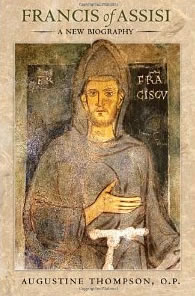Book Notes
 Augustine Thompson, Francis of Assisi; A New Biography (Ithaca: Cornell University Press, 2012), 299pp.
Augustine Thompson, Francis of Assisi; A New Biography (Ithaca: Cornell University Press, 2012), 299pp.
Any biography of Francis of Assisi (1181/2–1226) faces two formidable challenges — the complexity of the medieval sources, and the saintliness of a subject who evokes hagiography. Augustine Thompson tackles both challenges head on, and the result is a new gold standard for any future work on Saint Francis. His rigorous historical method moves beyond mere speculation and pious edification, and yet does so with a genuine reverence for his subject.
This volume has two distinct parts. The first half (3–141) is an uncluttered narrative of the life of Saint Francis. The second half is a meticulous and comprehensive bibliographical essay on the sources and methods of Franciscan scholarship (143–291). Francis's family was wealthy but not aristocratic. In 1205, Francis renounced family and wealth in favor of a vagabond life as a lay penitent, centered around serving lepers, manual labor repairing churches, and fervent devotion to the Eucharist. In 1208, two followers joined him, and the three of them sought priestly advice on their "form of life." On April 16, 1208 the priest opened the missal to three random passages that would later define the Franciscan Order: go and sell all you have, take nothing for the journey, deny yourself and follow Jesus.
For many years after this official conversion to radical renunciation, the Franciscan movement was fluid and "free form." By 1216, Francis was a celebrity, and by 1219 he was known in far away England. Nonetheless, there was no official "rule" or governance until 1221. Therein lies one of the many complexities of a "deeply conflicted" Francis. How do you bottle the lightning of a growing, international and dynamic mass movement, led by a famous figure, who lacked the skills and temperament of organizational leadership? Francis resigned as head of the movement in 1220, but everyone knew that he held all the power. How could he be less than all and subject to all if he had to judge others as their leader? Francis never made peace with the necessary transformation of his movement into a regularized institution. Thanks to Thompson, what emerges here is not an inimitable figure who transcends history, but a normal human being who grappled deeply with the invitation of Jesus to "give all, take nothing, and embrace the cross."


